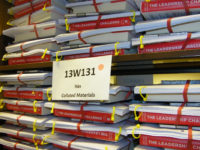The misleading claims on fair dealing extend beyond the impact of the 2012 reforms and the wildly exaggerated claim of 600 million uncompensated copies each year. Given that educational institutions have increased their licensing spending since 2012, Access Copyright has sought to downplay the investment at the copyright review by arguing that site licensing is primarily focused on access to journals while copying for coursepacks predominantly involves excerpts from books. The implication of the Access Copyright argument is that book copying remains as relevant as ever and that site licensing does not cover that form of copying. These arguments are misleading, however, since the data suggests that book copying is rapidly declining as part of coursepacks, coursepacks themselves represent a small percentage of course materials, and books are in any event an increasingly large part of university site licensing. Posts over the next three days will address each of these issues.
Archive for November 21st, 2018

Law Bytes
Episode 259: The Privacy and Surveillance Risks of AI Chatbot Reporting to Police
byMichael Geist

March 2, 2026
Michael Geist
February 23, 2026
Michael Geist
February 9, 2026
Michael Geist
Episode 256: Jennifer Quaid on Taking On Big Tech With the Competition Act's Private Right of Access
February 2, 2026
Michael Geist
The Law Bytes Podcast, Episode 255: Grappling with Grok – Heidi Tworek on the Limits of Canadian Law
January 26, 2026
Michael Geist
Search Results placeholder
Recent Posts
 Why the Online Harms Act is the Wrong Way to Regulate AI Chatbots
Why the Online Harms Act is the Wrong Way to Regulate AI Chatbots  More Transparency Not Police Reporting: Navigating the Safety-Privacy Balance for AI ChatBots
More Transparency Not Police Reporting: Navigating the Safety-Privacy Balance for AI ChatBots  The Law Bytes Podcast, Episode 259: The Privacy and Surveillance Risks of AI Chatbot Reporting to Police
The Law Bytes Podcast, Episode 259: The Privacy and Surveillance Risks of AI Chatbot Reporting to Police  Nobody Wants This: Senate Rejects Government’s Anti-Privacy Plan for Political Parties By Sending Bill Back to the House With a Sunset Clause
Nobody Wants This: Senate Rejects Government’s Anti-Privacy Plan for Political Parties By Sending Bill Back to the House With a Sunset Clause  The Law Bytes Podcast, Episode 258: Jaxson Khan With an Insider Perspective on AI Policy Development in Canada
The Law Bytes Podcast, Episode 258: Jaxson Khan With an Insider Perspective on AI Policy Development in Canada

